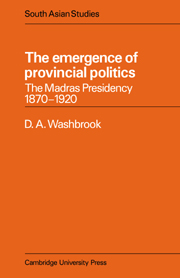Book contents
- Frontmatter
- Contents
- Preface
- Abbreviations, notes on references and spelling
- Introduction
- 1 The Madras Presidency
- 2 The governance of Madras
- 3 The political economy of Madras
- 4 Local structures of political power
- 5 The emergence of provincial politics
- 6 The vocabulary of communal politics
- 7 The Home Rule League, Justice Party and Congress
- Conclusion
- Glossary
- Bibliography
- Index
3 - The political economy of Madras
Published online by Cambridge University Press: 21 September 2009
- Frontmatter
- Contents
- Preface
- Abbreviations, notes on references and spelling
- Introduction
- 1 The Madras Presidency
- 2 The governance of Madras
- 3 The political economy of Madras
- 4 Local structures of political power
- 5 The emergence of provincial politics
- 6 The vocabulary of communal politics
- 7 The Home Rule League, Justice Party and Congress
- Conclusion
- Glossary
- Bibliography
- Index
Summary
In our discussion of the nature and organisation of government in Madras, we have noted the enormous reliance of the bureaucracy on local notables. Lacking an effective coercive arm in the locality, Fort St George's rule rested on the empires of control and authority operated independently of it by some of its subjects. In this chapter, we shall be concerned to probe the character of these empires; our purpose will be to discover who ran them, how they were run and how their internal structure and external relations were changing over time. Clearly, such an undertaking is fraught with difficulty for we are asking no less than why did some South Indians obey others. A complete answer, if it were possible, would have to follow Aristotle and travel from the household to the nation and from the family to the culture and beyond. Such an answer could have no end. Nor, more importantly, could it have a beginning. Some social relationship would have to be examined first and hypothesised as the base on which the other relationships are seen to act. If a base itself were not defined, the relationships could then be seen only as reacting to each other without priority and no specific point about them could be explained. Indeed explanation would have to give way to description alone. Yet to choose a base, be it religious culture or economics, is to make an assumption about behaviour which can never be tested but which determines the whole answer. Abstract arguments about why Indian society operates in the way that it does by their nature cannot be satisfactory.
- Type
- Chapter
- Information
- The Emergence of Provincial PoliticsThe Madras Presidency 1870–1920, pp. 64 - 145Publisher: Cambridge University PressPrint publication year: 1976
- 1
- Cited by



